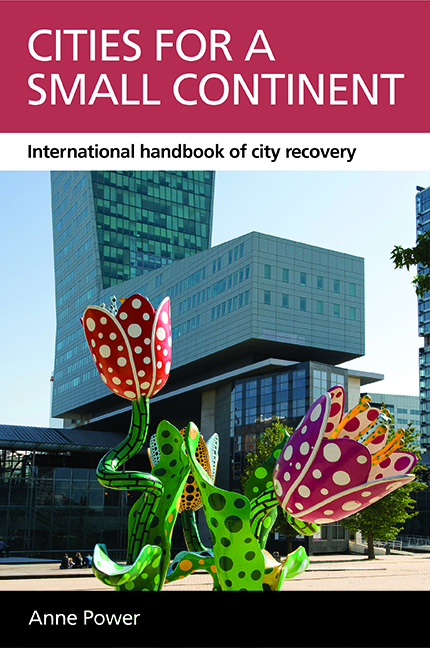Book contents
- Frontmatter
- Contents
- List of tables and figures
- Abbreviations and acronyms
- Acknowledgements
- Copyright material
- Foreword
- one Lessons from cities in a crowded continent Tale of a city – Bilbao
- two Divided and united Europe Tale of a city – Belfast
- three Grit and vision Tale of a city – Sheffield
- four Struggle and strive Tale of a city – Lille
- five Threats and opportunities Tale of a city – St Étienne
- six Over-scale and under-scale Tale of a city – Torino
- seven The power of social innovation Tale of a city – Leipzig
- eight Shoots of growth in older industrial cities in the US Tale of a city – Detroit
- nine Finding new ways out of the woods
- Endnotes
- References
- Afterword
- La Fabrique de la Cité
- Index
six - Over-scale and under-scale Tale of a city – Torino
Published online by Cambridge University Press: 01 September 2022
- Frontmatter
- Contents
- List of tables and figures
- Abbreviations and acronyms
- Acknowledgements
- Copyright material
- Foreword
- one Lessons from cities in a crowded continent Tale of a city – Bilbao
- two Divided and united Europe Tale of a city – Belfast
- three Grit and vision Tale of a city – Sheffield
- four Struggle and strive Tale of a city – Lille
- five Threats and opportunities Tale of a city – St Étienne
- six Over-scale and under-scale Tale of a city – Torino
- seven The power of social innovation Tale of a city – Leipzig
- eight Shoots of growth in older industrial cities in the US Tale of a city – Detroit
- nine Finding new ways out of the woods
- Endnotes
- References
- Afterword
- La Fabrique de la Cité
- Index
Summary
Cities will not be smaller, simpler or more specialised than cities of today. Rather, they will be more intricate, comprehensive, diversified and larger than today's and will have even more complicated jumbles of old and new than ours do
Jane Jacobs, The Economy of CitiesBox 6.1: Leipzig – a story
Leipzig's central station reminds a visitor of a cathedral. Its huge, arched, glass roof covers scores of railway lines departing all over Europe, particularly eastwards. Its gleaming shopping arcades, built into the now oversized structure, are teaming with shoppers. Outside the station, the cobbled square, criss-crossed with trams, looks to the narrow main street where new jostles with old.
There are two showstoppers: first, the open square outside the Nikolaikirche where demonstrators braved the mounted police in the late 1980s and, through daily peaceful protests and weekly prayer meetings in the church, accelerated the cataclysmic collapse of East German Communism in 1989. Leipzig's peaceful stand helped reshape a whole continent.
The other showstopper is a scruffy shop window further down the street where Leipzig's citizens still hand in for sale relics from the Communist past – old state regulated clothing, standard issue metal cups and plates, lamps and torches for when the electricity failed, school books, army boots – anything that curiosity-seekers value as reminders of 40 years under strict East German Communism.
On the edge of the city is another showstopper, the ultra-modern BMW car plant, designed by Zaha Hadid, the famous architect of London's glorious Olympic pool. If you could ever call a car factory glorious, this would be it. The huge glass front, under the sweeping roof, reveals the automated conveyor belt with shiny cars rolling along it, high above ground. Visitors gaze upwards as a motor drama rolls by. It is home now to the most advanced breakthrough in electric cars – with zero carbon emissions and potentially fuelled on 100% renewable energy.
Young people crowd to the city, and bemoan the loss of free space as others follow in hot pursuit of opportunity. Leipzig has truly gone from bust to boom, against all predictions.
Introduction
European cities are deeply affected by the turmoil of decline, recovery, then the still-rumbling financial crisis of 2008 which has cost them jobs, cut public resources and dented their recent recovery.
- Type
- Chapter
- Information
- Cities for a Small ContinentInternational Handbook of City Recovery, pp. 177 - 218Publisher: Bristol University PressPrint publication year: 2016



